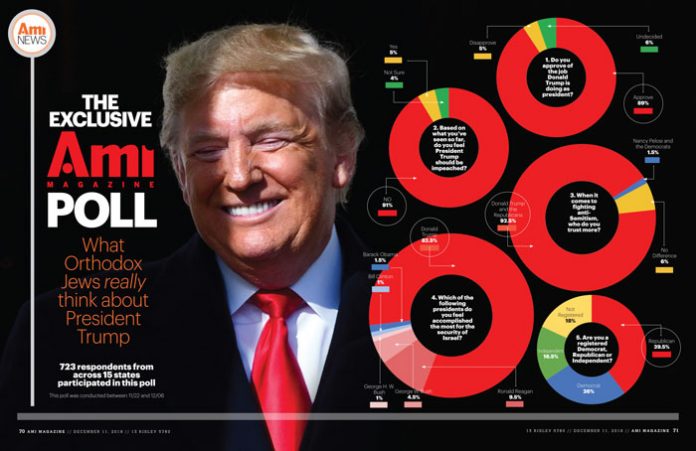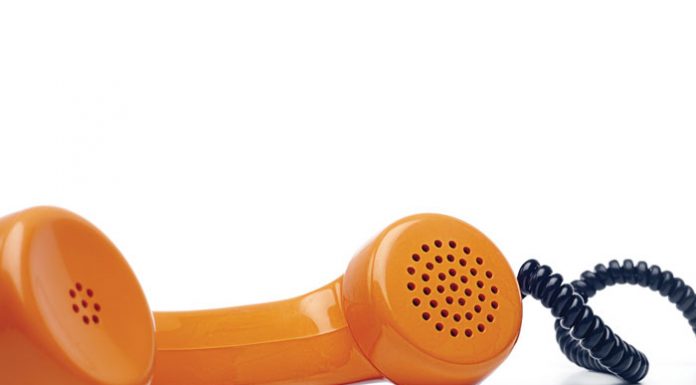What percentage of American Jewry identifies as Orthodox? Chances are, especially if you’ve ever seen any of the polls that have been conducted over the past few decades, that your answer will be 10%. Because that’s what the polls keep saying. Consistently. For decades.
Can those polls be right? Not according to the polls themselves.
For example, the oft-cited Pew study on American Jews from 2013 maintained that only 10% identify as Orthodox, despite an intermarriage rate ranging from 0% to 2%, and a birthrate as high as 6.4 per woman.
Especially now, in the era of Trump, concerns over the accuracy of Jewish representation has become a hot topic of discussion. During a recent fundraiser with Orthodox Jewish supporters in Manhattan, President Trump asked no less than five times how it can be that only 25% of American Jews support him after all he’s done on behalf of Israel.
Is the president aware of his overwhelming support among Orthodox Jews? Yes. I know this for a fact, because POTUS and I discussed it during an off-the-record meeting in the Oval Office earlier this year.
For real numbers, Ami Magazine set out on a month-long mission to gauge what Orthodox Jews across America think of President Trump three years into his first term. The goal was to have close to 1,000 Orthodox Jewish respondents from at least 12 different states across a combination of landlines and cell phones before our deadline in early December.
After the first 300 surveys were completed, the pollsters shared their findings with us. I must say that I was unprepared for what I saw. Then the next set of 300 came in sometime later, and the results remained more or less consistent.
What Turned Orthodoxy into MAGA Country?
Before anyone takes support for Trump among Orthodox Jews for granted, let’s break down the findings of previous polls to better understand the broader picture. According to a survey conducted by the American Jewish Committee, 54% of Orthodox Jews said that they voted for Trump in 2016. One year into his presidency, 71% of Orthodox Jews supported him, and that was before he commuted the sentence of Sholom Mordechai Rubashkin and recognized Jerusalem as the capital of Israel.
Then in 2018, in a Tri-State-area poll commissioned by Ami Magazine, 82% of respondents said that they would vote for Trump in 2020. And as this year’s Ami poll reveals, support for the president has now hit a whopping 89%. What this upward trajectory makes abundantly clear is that more and more Orthodox Jews are fans of the 45th president of the United States.
Why do Orthodox Jews support Trump? Ask 100 people and you will receive answers as diverse as Orthodox Jews themselves. You might hear about his recognition of Jerusalem, record-high economic numbers, fighting against religious persecution around the world, the eradication of ISIS, decertification of the Iran deal, the release of Mr. Rubashkin, prison reform, standing up to the United Nations, border security, appointment of conservative judges and issuance of executive orders that promote religious liberty—among other things. The fact that he expelled the last living Nazi from America and was the first president to publicly honor Holocaust survivors at a formal White House event doesn’t seem to have hurt his popularity either.
Digging Deeper: How Are Orthodox Jews Polled Anyway?
Even when Orthodox Jews are polled, the results are often unorthodox. Take the recent survey conducted by the Pat Brown Institute for Public Affairs at Cal State Los Angeles in conjunction with the research firm Evitarus, which sampled close to 2,000 Jews in Los Angeles County—mostly online, with a smattering of phone calls mixed in. It was found that 70% of Orthodox Jews were supportive of the president. Nothing wrong with that, and their efforts are both lauded and appreciated. But it turned out that fewer than 100 participants in that survey identified as Orthodox.
Ordinarily, a poll with just 99 participants would be considered inconclusive. But it often happens that data about Orthodox Jews are extracted from much larger polls in which Orthodox Jews are no more than a small percentage, which is then passed off as a “poll of Orthodox Jews.” And bless ’em for trying, because sometimes that’s all that’s available.
To be fair, if a mainstream polling company decided to go through the hassle of compiling a national database of Orthodox Jewish contacts, they would likely find themselves frustrated by how many callers refuse to participate, not including those who hang up in the middle due to the insensitive wording of a question. That’s why Ami Magazine’s recent poll provides such a valuable service. Each of the respondents identified as either ultra-Orthodox/chareidi, Modern Orthodox or traditional Orthodox. Some 5.4% of respondents preferred not to say.
Most of the findings were consistent across the various groups, with the ultra-Orthodox being more supportive of the president than the Modern Orthodox. What the chareidi and Modern Orthodox had in common was a very low rate of being undecided about Trump and whether they supported impeachment (about 2% for both demographics, in both categories). Interestingly, nearly three times as many “traditionalists” said that they were undecided about the job Trump is doing.
Also of interest was that while a majority in each subgroup believes that Trump has done more for the security of Israel than any other president since 1980, George H.W. Bush polled best among the Modern Orthodox, while Bill Clinton polled best among those who preferred not to identify with any of the categories. Still, neither “Poppy” Bush nor Clinton received more than 1% overall. More than any other question, 88 respondents chose to skip the one about Israel’s security. Conversely, the only question that nobody skipped was the one about Trump’s approval rating.
What really stood out was that although 26% of respondents identified as Democrats, most of them said they didn’t trust their own party when it came to fighting anti-Semitism. It would appear that repeated instances of House Democrats refusing to sufficiently condemn anti-Semitic trope-peddlers in their ranks, as well as an upsurge in anti-Israel/pro-BDS rhetoric among certain party members, hasn’t gone over too well with this demographic, whose high visibility renders them even greater targets within the most targeted minority in the United States.
In Conclusion
What’s the takeaway from all this? That while President Trump enjoys a greater percentage of support among Orthodox Jews than any other religious group, denomination or demographic, it is support that he has rightfully earned because of three years of hard work and genuine results.





















